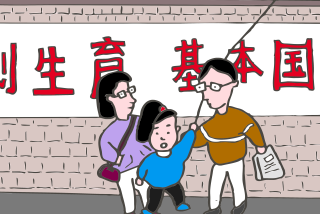The system that divides China
- Share via
The language was blunt; the tone direct. “We hope that decades of Chinese government maladministration can end with this generation. . . . Let the next generation enjoy the sacred constitutional guarantees of freedom, democracy and equality.”
A press statement by overseas Chinese dissident groups? A human rights report by the U.S. State Department? No. This was a unique joint editorial published March 1 by 13 independent-leaning Chinese media outlets, spread across 11 provinces and cities, in the lead-up to the annual session of the national legislature, which concluded Sunday. The target of their criticism: the Chinese household registration, or hukou, system. The editorial is but one sign of the growing popular pressure for deep reform of the system.
Established in the 1950s, the household registration system originally served Maoist goals of population control and state economic planning. It locked Chinese citizens to a particular place of residence. It classified them as urban or rural, agricultural or nonagricultural. And it granted preferential treatment -- on food rations, housing and education -- to urban industrial workers.
Post-1978 economic liberalization has eroded many of these restrictions, such as travel. As anyone who has ever attempted to shove their way onto an overcrowded train in China during the Lunar New Year travel season can attest, average Chinese citizens enjoy (and exercise) massive freedom of physical movement throughout the country.
But residency status remains tightly linked to a range of rights and privileges, particularly urban social benefits. Most rural migrants to Chinese cities are unable to obtain equal public services such as healthcare and schooling for their children. And because residency status is hereditary, with limited channels to change one’s status, this disparity risks hardening into a permanent divide. Generations of migrant children born and raised in Chinese cities might grow up as a legally excluded urban underclass.
The good news is that Chinese authorities have undertaken tentative steps to address this discrimination. Under a 2009 tort law, lives of urban and rural residents can be valued equally in calculating death compensation for major accidents. Last week, the Chinese legislature amended the election laws to count rural and urban residents equally in determining legislative representation. (Prior law weighted rural residents as one-quarter of their urban counterparts). And assorted local experiments have enabled a thin “upper crust” of rural migrants to obtain full-blown urban residence status in major Chinese cities.
But these reforms remain highly limited in practice. Recent electoral reforms sidestepped crucial questions of whether to allow migrants to vote and stand for election in the cities where they work. Tough economic conditions for obtaining urban residency under many local reforms (such as actually purchasing a house) exclude low-income rural migrants living in rental apartments. In the northern city of Shijiazhuang, such reforms generated a mere 11,000 applicants for urban registration, out of a total population of about 300,000 migrant workers.
In addition, many national and local reforms have ground to a halt over thorny funding issues. Local governments resist shouldering the burden for extending education and health benefits to migrants. Many urban residents oppose cuts to their privileged levels of access to public services.
Chinese officials also have not responded positively to efforts by activists and journalists to foster public discussion of these issues. Last week, foreign news outlets reported that Zhang Hong, one of the key editors responsible for the March 1 joint editorial, was forced to resign. And authorities have deleted the editorial itself from websites throughout China.
Effectively addressing the plight of Chinese migrants requires much deeper reforms to the hukou system. It requires breaking the hereditary nature of the residency system. It requires shifting funds to better provide for migrant needs. It requires eliminating the 1950s-era regulations that underlie the hukou system and eroding the iron linkage between residency status and public services. And it requires a frank and open discussion of these issues in the Chinese media.
Chinese authorities need to directly address popular calls for change and deepen their reforms. These are not demands by foreign governments. They are earnest calls by the Chinese public -- citizens deeply concerned about the growing inequality in their cities.
Carl Minzner is an associate professor of law at Washington University in St. Louis.
More to Read
Sign up for Essential California
The most important California stories and recommendations in your inbox every morning.
You may occasionally receive promotional content from the Los Angeles Times.













